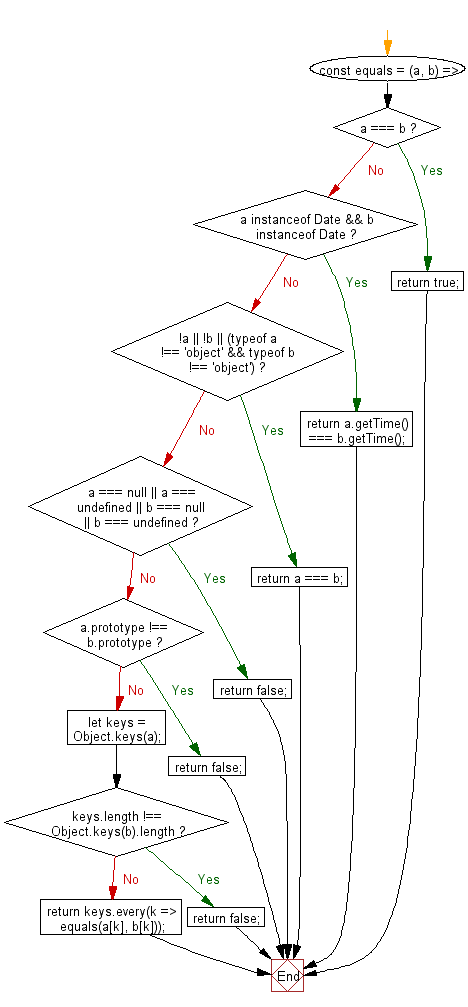JavaScript: Perform a deep comparison between two values to determine if they are equivalent
JavaScript fundamental (ES6 Syntax): Exercise-47 with Solution
Deep Comparison for Equivalence
Write a JavaScript program to perform a deep comparison between two values to determine if they are equivalent.
Note: Check if the two values are identical, if they are both Date objects with the same time, using Date.getTime() or if they are both non-object values with an equivalent value (strict comparison). Check if only one value is null or undefined or if their prototypes differ. If none of the above conditions are met, use Object.keys() to check if both values have the same number of keys, then use Array.every() to check if every key in the first value exists in the second one and if they are equivalent by calling this method recursively.
- Check if the two values are identical, if they are both Date objects with the same time, using Date.prototype.getTime() or if they are both non-object values with an equivalent value (strict comparison).
- Check if only one value is null or undefined or if their prototypes differ.
- If none of the above conditions are met, use Object.keys() to check if both values have the same number of keys.
- Use Array.prototype.every() to check if every key in a exists in b and if they are equivalent by calling equals() recursively.
Sample Solution:
JavaScript Code:
//#Source https://bit.ly/2neWfJ2
// Define a function 'equals' that compares two values 'a' and 'b' for deep equality.
const equals = (a, b) => {
// Check if 'a' and 'b' are strictly equal.
if (a === b) return true;
// Check if 'a' and 'b' are instances of Date objects and have equal time values.
if (a instanceof Date && b instanceof Date) return a.getTime() === b.getTime();
// Check if either 'a' or 'b' is null, undefined, or not an object, and if they are equal.
if (!a || !b || (typeof a !== 'object' && typeof b !== 'object')) return a === b;
// Check if either 'a' or 'b' is null, undefined, or if their prototypes are not equal.
if (a === null || a === undefined || b === null || b === undefined || a.prototype !== b.prototype) return false;
// Get the keys of 'a'.
let keys = Object.keys(a);
// Check if the number of keys in 'a' is equal to the number of keys in 'b'.
if (keys.length !== Object.keys(b).length) return false;
// Check if every key-value pair in 'a' is equal to the corresponding key-value pair in 'b'.
return keys.every(k => equals(a[k], b[k]));
};
// Test the 'equals' function with two objects and log the result.
console.log(equals({ a: [2, { e: 3 }], b: [4], c: 'foo' }, { a: [2, { e: 3 }], b: [4], c: 'foo' })); // Output: true
Output:
true
Flowchart:

Live Demo:
See the Pen javascript-basic-exercise-1-47 by w3resource (@w3resource) on CodePen.
For more Practice: Solve these Related Problems:
- Write a JavaScript program that performs a deep comparison between two objects, arrays, or primitives.
- Write a JavaScript function that recursively checks if two values are equivalent, handling nested structures.
- Write a JavaScript program that compares two complex data structures for equality without using JSON.stringify.
Go to:
PREV : Curry a Function.
NEXT : Array of Function Property Names.
Improve this sample solution and post your code through Disqus
What is the difficulty level of this exercise?
Test your Programming skills with w3resource's quiz.
